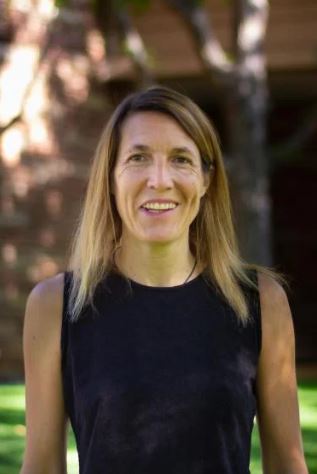Magnetometers allow new insights into the human brain
Carl-Zeiss-Humboldt Research Award for Svenja Knappe
The Carl-Zeiss-Humboldt Research Award 2023 goes to quantum optician Svenja Knappe from the University of Colorado at Boulder, USA. She is currently conducting research at Fraunhofer IPM as a guest scientist. Since 2022, the Humboldt Foundation is presenting an annual award to an internationally recognized scientific personality from abroad. The award is funded by the Carl Zeiss Foundation.

Prof. Knappe has made crucial contributions to the development of the fields of magnetometry and quantum sensing. After obtaining her doctorate in 2001 and a first postdoc stay in Bonn, Knappe began researching at the National Institute of Standards and Technology NIST, Boulder, USA in 2003. In 2013, she proceeded at the University of Colorado Boulder and was promoted to full professor there in 2022. In addition to her academic work, she also works successfully in industry. She played an important role in the development of QuSpin’s quantum sensors and founded the internationally active company FieldLine in 2017.
Knappe is the world’s leading researcher in the area of magnetic field measurement using optically pumped magnetometers, which can visualize brain waves in 3D. This technology can lead to a breakthrough in the advancement of biomedical technology, as it enables neuroscience to measure the electrical activity of the entire brain at once, online and non-invasively. Knappe's work thus offers a new tool that promises unimagined possibilities beyond brain research for diagnostics, surgery planning and human-machine control.
Her stay at the University of Freiburg as a visiting scientist and the research cooperation with Fraunhofer IPM are intended, on the one hand, to stimulate new collaborations in the field of magnetometry. On the other hand, she aims at initiating technical developments that are important for the commercialization and widespread use of these technologies. In Germany, Knappe also collaborates with the University Medical Center Freiburg, the Charité and the Physikalisch-Technische Bundesanstalt PTB (National Metrology Institute of Germany).
In collaboration with the research center Intelligent Machine-Brain Interfacing Technology (IMBIT) in Freiburg, Fraunhofer IPM organizes a workshop on the use of optically pumped magnetometers (OPM) for magnetoencephalography (MEG). This OPM-MEG workshop will be held at Fraunhofer IPM at the end of this year. A keynote talk on the commercial development of OPM will be held by Prof. Knappe. More information about the workshop is available here: www.ipm.fraunhofer.de/opm-meg.
Background
| The Carl Zeiss Humboldt Research Award targets researchers working in science, technology, engineering or mathematics (STEM fields), who are seeking to collaborate with specialist colleagues in federal states in Germany where the Carl Zeiss Foundation provides sponsorship (Baden-Württemberg, Rhineland-Palatinate and Thuringia). The award honours researchers who have shaped their field even beyond their immediate research. |